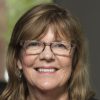As a college student at the University of Virginia in the 1970s, Laurie deBettencourt, PhD, volunteered at an elementary school that had some students who would now be identified as on the autism spectrum. With no internet and little understanding of the best methods to work with these students, deBettencourt says she found herself intrigued by the challenge and the heartache of the families affected.
At the time, teachers working with different learners with disabilities were trained in only one umbrella category of “mental retardation,” she says, either for those expected to be institutionalized or for those considered educable. After visiting an institution as part of her training, deBettencourt decided to pursue teaching for educable special needs students, and she’s never looked back.
“It’s challenging and fascinating, in the sense there could be a child you work with who has a specific label,” she says. “The labels are important for communication with parents and to get financial support, but they don’t always tell the whole story of a child.” Because each child learns differently, she says she advises teachers to keep a Mary Poppins–type bag with lots of tricks to pull out to discover what works.
deBettencourt, who has been at Johns Hopkins since 2006, is professor and program lead for special education programs at the School of Education, overseeing all master’s programs and certificates. In addition, she is principal investigator on a state Department of Education–funded program training paraprofessionals to be special educators. She is past editor of TESE (Teacher Education and Special Education), the journal of the Teacher Education Division of the Council for Exceptional Children, and has co-authored several textbooks and written many articles about the instruction of students with mild-to-moderate disabilities.
For years, deBettencourt has been an advocate for innovative training for teachers. Soon after she joined Johns Hopkins, she helped write grants for the university to receive state funding to provide a combination of in-person and distance learning education to teachers on Maryland’s Eastern Shore who had students with special needs but couldn’t travel to Baltimore for courses. As editor of TESE, she oversaw a special issue with her colleague Tamara Marker on why it’s critical for teachers who work with students on the autism spectrum to understand evidence-based practices.
“Unlike other kids who might pick up what the teacher is explaining, kids with autism need very specific instruction in terms of social and academic behaviors,” she explains. “They need things to be routine and very specific, and they’re already somewhat behind. If we don’t use those practices, there won’t be as much growth and success.”
Johns Hopkins’ special education programs also push the use of evidence-based practice, and to use reflection and evaluation for continuous improvement. But deBettencourt imparts her own additional wisdom, encouraging teachers to make learning fun and individualized, to remember the teachers they had who made them feel special, and to emulate them.
“We’re required by law to help students with disabilities learn and to help parents understand what they can do at home, but we also want to make the kids feel good,” she says. “Every child has his own unique characteristics, and if you could just put yourself in their place you can unlock the part of them that wants to learn. That’s why I’m still here. I just love the kids.”
In 2018, deBettencourt received a Fulbright Scholarship to teach special educators at Eötvös Loránd University in Budapest, Hungary, and learn about special education practices from her students from Finland, Hungary, and Germany. The Hungarian university has an international reputation for training and research in the area of learning disabilities. She also has been researching how to train special educators to best work with students with learning disabilities and for whom English is a second language.

